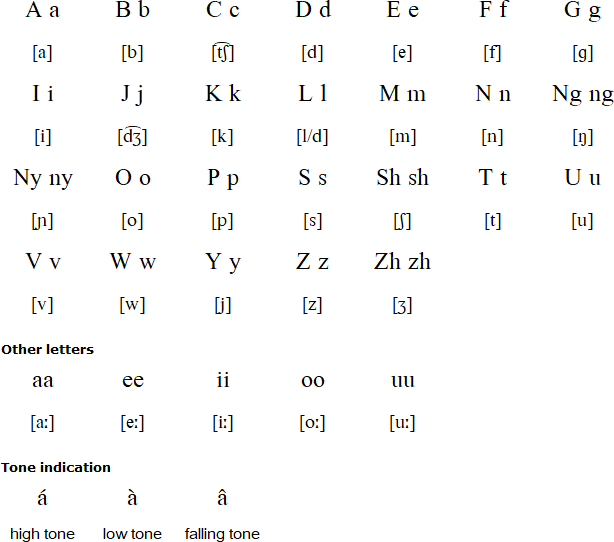Kanyok is a Bantu language spoken by about 200,000 people in the south of the Democratic Republic of the Congo. In particular, Kanyok is spoken in Mwene Ditu, Kanda-Kanda, Mulundu, Katshinsungu, Kanutshina and Ngandajika in Lomami Province, and also in Bushimaie in Luiza Territory in Kasaï-Central Province.
Kanyok is also known as Kanioka or Kanyoka, and Kanyok speakers call their language Ciin kanyòk. Dialects include Cii-milèmbw, Ciley and Ciin-a-luul. It is written with the Latin alphabet.

Download an alphabet chart for Kanyok (Excel)
Details of Kanyok alphabet and pronunciation provided by Wolfram Siegel (PDF)
Ku butambwiil, haakady Mawej muhang biit byoos, Diiy dyaakadyok kal. Diiy dyaakady ni Mawej, ni Diiy dyaakady Mawej. Naak Diiy dyaakady ni Mawej ku butambwiil. Mawej uhangil biit byoos ni Diiy. Kakwiish ciit neng cyaakaabumw cihangilobw kaciy cihang ni Diiy. Diiy dyaakady ni buumy, ni bwiin buumy oobw bwaakady citookej kudy baat. Citookej citootookesh haash hafulul, ni haash hafulul kahiishoh bend mwa kujimbakany citookej. Kwiiyil muut mukwaabw utuminobw kudy Mawej, diijin dindiy Jah. Muut oow wiiyil bu kajaady bwa kujaadikil baat myand ya citookej, bwa ney baat boos biitabij bwa ha mut ha myand yaakadyey wiibajaadikil.
In the beginning was the Word, and the Word was with God, and the Word was God. The same was in the beginning with God. All things were made by him, and without him was not any thing made that was made. In him was life, and the life was the light of men. And the light shineth in darkness, and the darkness comprehended it not. There was a man sent from God, whose name was John. The same came for a witness, to bear withness of the Light, that all men through him might believe.
Source: https://www.language-museum.com/encyclopedia/k/kanyok.php
Information about Kanyok | Numbers
Information about Kanyok
https://en.wikipedia.org/wiki/Kanyok_language
https://fr.wikipedia.org/wiki/Kanyok_(langue)
http://www.language-archives.org/language/kny
https://glottolog.org/resource/languoid/id/kany1247
Aka, Bafaw-Balong, Bangi, Bangubangu, Basaa, Bemba, Bembe, Bena, Benga, Bhaca, Bila, Bube, Budu, Bujeba, Bukusu, Bulu, Bushong, Central Kilimanjaro, Central Teke, Chichewa, Chokwe, Chuwabu, Comorian, Dciriku, Digo, Duala, Eton, Ewondo, Fang, Fuliiru, Ganda/Luganda, Gogo, Gusii, Gwere, Gyele, Haya, Hehe, Herero, Ibinda, Idaxo-Isuxa-Tiriki, Ikizu, Ikoma, Jita, Kabwa, Kako, Kamba, Kanyok, Kiga, Kikuyu, Kimbundu, Kinyarwanda, Kirundi, Kisi, Kobo, Kogo, Komo, Kongo, Konjo, Koti, Kukuya, Kunda, Kuria, Kwambi, Kwasio, Lambya, Lengola, Lingala, Loma, Lozi, Luba-Katanga, Luchazi, Lunda, Luvale, Luyana, Makaa, Makonde, Makhuwa, Mandekan, Maore, Masaaba, Mbama, Mbere, Mbosi, Mbukushu, Mbunda, Mbuun, Mende, Mongo, Mpiemo, Mushungulu, Mwani, Myene, Nambya, Nande, Ngoni, Ngwii, Njebi, Nkore, North Teke, Northern Ndebele (South Africa), Northern Ndebele (Zimbabwe), Northern Sotho, Nyamwezi, Nyakyusa, Nyemba, Nyole, Nyoro, Nyungwe, Nzadi, Oroko, OshiWambo, Pagibete, Punu, Ronga, Safwa, Seki, Sena, Sengele, Shona, Soga, Songe, Southern Ndebele, Southern Sotho, Suba, Sukuma, Swahili, Swati, Taita, Talinga, Tanga, Tembo, Tetela, Tonga, Tooro, Tshiluba, Tsonga, Tswa, Tswana, Tumbuka, Umbundu, Venda, Vili, Vwanji, West Teke, Xhosa, Yakam, Yansi, Yao, Yasa, Yeyi, Zigula, Zinza, Zulu
Languages written with the Latin alphabet
Page created: 19.06.25. Last modified: 19.06.25
[top]
You can support this site by Buying Me A Coffee, and if you like what you see on this page, you can use the buttons below to share it with people you know.

If you like this site and find it useful, you can support it by making a donation via PayPal or Patreon, or by contributing in other ways. Omniglot is how I make my living.
Note: all links on this site to Amazon.com, Amazon.co.uk
and Amazon.fr
are affiliate links. This means I earn a commission if you click on any of them and buy something. So by clicking on these links you can help to support this site.
[top]